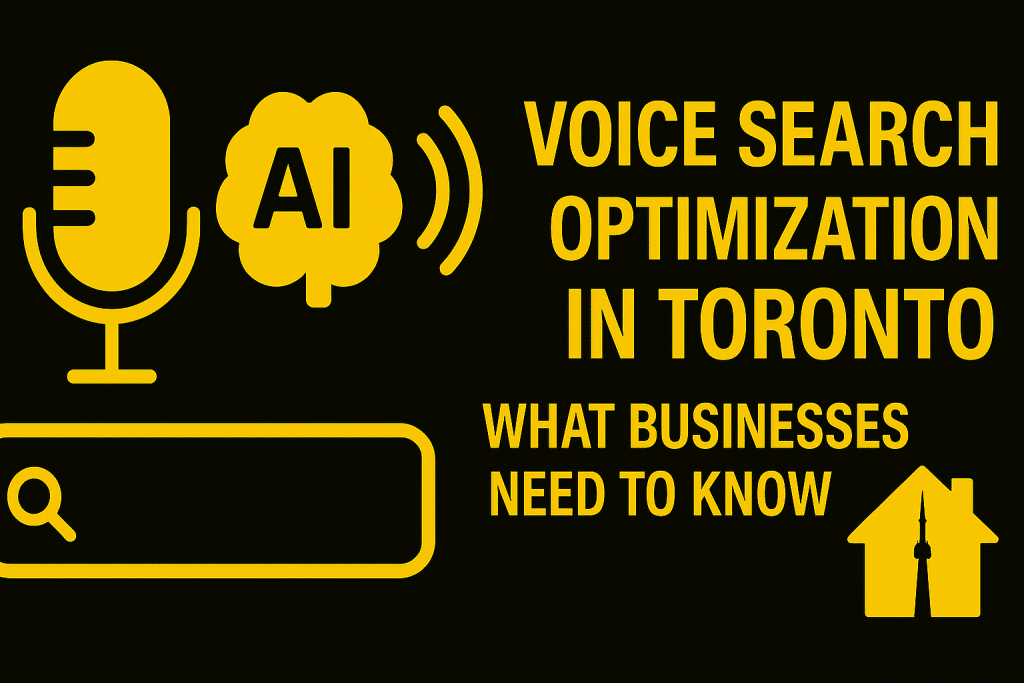Voice search is no longer a futuristic concept — it’s an everyday reality. In Toronto, where businesses compete fiercely for local visibility, optimizing for voice search has become a critical SEO strategy. From Google Assistant to Siri and Alexa, users increasingly rely on spoken queries to find nearby services, get instant answers, and make purchasing decisions. For businesses targeting Toronto’s competitive digital landscape, understanding voice search optimization is no longer optional — it’s essential.
Why Voice Search Matters for Toronto Businesses
A Rapid Shift in Search Behavior
According to Google, over 27% of the global online population uses voice search on mobile. In urban hubs like Toronto, where commuters, busy professionals, and younger demographics rely on mobile devices, voice search usage is even higher. People no longer just type “best Thai restaurant Toronto”; they ask, “Hey Google, what’s the best Thai restaurant near me?”
This conversational style has changed how search engines interpret intent. For Toronto businesses, ranking for voice search can mean dominating “near me” results, increasing foot traffic, and converting mobile users who are ready to take action.
Local SEO and Voice Search Are Interconnected
Voice searches are overwhelmingly local. Queries like “Where’s the nearest carpet cleaning service in Downtown Toronto?” or “Which SEO company is best in Toronto?” trigger local pack results, Google Business Profile snippets, and featured answers. Businesses that have optimized their local SEO strategy are naturally better positioned to win voice search queries.
How Voice Search Works: Understanding Google’s Intent
Conversational Queries
Unlike short keyword phrases, voice searches are typically longer and phrased as natural language questions. Instead of “plumber Toronto,” users might say, “Who’s the best plumber open near me right now?”
Entity-Based Understanding
Google’s algorithm uses entity recognition to understand people, places, and things. Optimizing content to align with entity-based SEO — such as clearly describing services, locations, and attributes — improves the chance of being selected as the voice search answer.
Featured Snippets and Position Zero
Voice assistants often pull answers directly from Google’s featured snippets. Structuring content with clear, concise answers to common questions increases the likelihood of being featured. For example, if you’re an SEO agency, answering “How much does SEO cost in Toronto?” concisely could place your snippet at the top, giving your business a powerful voice search presence.
Key Voice Search Optimization Strategies for Toronto Companies
1. Optimize for Conversational Keywords
Long-tail, question-based keywords dominate voice search. Businesses should integrate conversational phrases like:
“Where can I find…”
“Who offers the best…”
“What’s the nearest…”
“How do I get to…”
For example, an agency might target “What’s the best SEO company in Toronto?” and create a dedicated guide that compares services and pricing, linking internally to resources like Top SEO Agencies in Toronto Using AI.

2. Strengthen Google Business Profile
A fully optimized Google Business Profile (GBP) is crucial for local voice searches. Accurate business hours, services, reviews, and location data help voice assistants provide precise answers. Profiles with regular updates, Q&A responses, and strong review signals have a better chance of surfacing in “near me” voice searches.
For local service companies, this aligns directly with strategies outlined in Google Business Profile Toronto.
3. Improve Page Speed and Mobile UX
Voice searches often happen on mobile devices. Slow-loading pages or poor mobile experiences can disqualify your site from voice search results. Google prioritizes sites that load quickly and are mobile-friendly, which also aligns with Core Web Vitals benchmarks. Improving technical performance not only benefits SEO rankings but also voice search visibility.
4. Create FAQ and Structured Data Markup
Adding FAQ sections with schema markup helps Google understand your content and present it in voice search responses. For example, a law firm might use FAQs like:
“How do I find a divorce lawyer near me in Toronto?”
“What’s the average cost of legal consultation?”
Structured data ensures that search engines interpret these answers accurately and can pull them for quick responses via voice assistants.
5. Focus on Local “Near Me” Optimization
Many Toronto-based searches happen on the go. Tourists asking “Where’s the nearest café in Kensington Market?” or locals searching for “SEO experts near me” rely on proximity signals. Businesses should:
Use location-specific landing pages
Add local keywords in headings and meta descriptions
Build consistent local citations (see Why Citation Building Still Matters)
Industry Examples: Voice Search in Action
Restaurants and Hospitality
Restaurants benefit enormously from voice search queries like “Best pho near me” or “Where can I get vegan sushi in Toronto?” High-quality local listings, menu markups, and positive reviews significantly increase their chances of being recommended by Google Assistant.
Service-Based Businesses
For plumbers, HVAC companies, or movers, being the top result for “Who’s open right now near me?” can mean immediate business. These companies must maintain updated GBP data, clear service area descriptions, and fast-loading mobile pages.
Professional Services and Agencies
Digital agencies, legal firms, and accountants should publish structured, authoritative content that answers client questions directly. A Toronto SEO agency, for example, can attract voice search users by creating resources like Hiring a Toronto SEO Expert vs Doing It In-House, which naturally targets user intent.
Voice Search Optimization and AI: The Future of Local SEO
Voice search is evolving rapidly thanks to AI advancements. Google’s integration of generative AI and Search Generative Experience (SGE) means that search engines understand conversational nuances better than ever. Businesses in Toronto that invest early in AI-driven SEO strategies, such as entity optimization and predictive content, will be well-positioned to dominate this new search frontier.
For a deeper understanding of how AI is impacting search, Toronto agencies are already adapting their strategies to stay competitive (The Future of SEO in Toronto).
Common Voice Search Mistakes to Avoid
Ignoring Local Intent
Voice search is inherently local. Ignoring local keywords, failing to create localized landing pages, or neglecting Google Business Profile details can push your business out of voice results.
Overlooking Schema Markup
Without structured data, Google may not fully understand your content, lowering your chances of being featured in voice answers.
Using Overly Generic Content
Content that doesn’t answer specific questions clearly won’t get picked up for featured snippets. Prioritize concise, authoritative answers.
Measuring Voice Search Performance
While Google Search Console doesn’t yet have a “voice search” filter, businesses can track performance by monitoring:
Increases in local search impressions and clicks
Higher rankings for long-tail, question-based keywords
Featured snippet acquisitions
Enhanced Google Business Profile engagement
Tracking analytics properly, as outlined in How to Track SEO Performance with Analytics, can reveal how voice optimization impacts overall SEO ROI.
Toronto Voice Search Optimization: Competitive Advantage
Toronto’s business landscape is crowded. Companies that adopt voice search optimization now can secure a competitive edge, especially in high-intent local queries. By focusing on conversational SEO, structured data, mobile performance, and local optimization, businesses position themselves where customers are actually searching — in real conversations with their devices.
For personalized voice SEO strategies tailored to your industry, Contact Toronto SEO to get expert guidance on dominating local search through voice.


